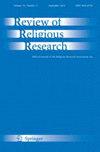犹太教、基督教和穆斯林宗教家庭中悔改的个人和关系过程
IF 1.7
1区 哲学
0 RELIGION
引用次数: 0
摘要
大量的社会科学研究揭示了宗教对个人和家庭的深远影响,而且主要是积极的影响。然而,包括忏悔在内的宗教的许多值得注意的方面尚未从社会科学的角度进行深入探讨,以了解其心理和关系过程及影响。此外,亚伯拉罕各宗教对悔改的强调和重视,以及社会科学家对更好地理解悔改和寻求神灵宽恕的过程的呼吁,都表明了以悔改为重点的研究的益处。随后,我们采用团队系统定性编码法,对 127 个美国犹太教、基督教和穆斯林模范家庭(N = 218)的悔改过程进行了二次分析。分析探讨了(a) 悔改的动机和前因后果,(b) 悔改的过程,(c) 帮助悔改的资源,以及 (d) 悔改的预期结果。此外,一些参与者认为悔改是消极的、中性的或无效的。文章讨论了悔改在宗教家庭中带来的心理和亲情方面的益处,尽管可能会产生一些不良后果,文章强调了悔改对从业人员和干预措施的影响,并提出了未来研究的主题。本文章由计算机程序翻译,如有差异,请以英文原文为准。
Personal and Relational Processes of Repentance in Religious Jewish, Christian, and Muslim Families
Considerable social science research has illuminated religion’s profound and predominantly positive impact on individuals and families. Nevertheless, numerous noteworthy aspects of religion, including repentance, have not been explored in-depth from a social science perspective to understand their psychological and relational processes and implications. Further, the emphasis and importance of repentance across the Abrahamic faiths, combined with calls from social scientists to better understand processes of repentance and seeking divine forgiveness, indicate the benefit of repentance-focused research. Subsequently, we used team-based systematic qualitative coding to conduct secondary analyses of repentance processes in interviews with 127 exemplar US Jewish, Christian, and Muslim families (N = 218). Analyses explored the: (a) motivations and antecedents of repentance, (b) processes of repentance, (c) resources to aid in repentance, and (d) perceived outcomes of repentance. Additionally, some participants described repentance as negative, neutral, or ineffective. The article discusses psychological and relational benefits of repentance in religious families despite some potentially adverse consequences, highlights implications for practitioners and interventions that incorporate repentance, and suggests topics for future research.
求助全文
通过发布文献求助,成功后即可免费获取论文全文。
去求助
来源期刊

Review of Religious Research
Multiple-
CiteScore
2.50
自引率
20.00%
发文量
31
期刊介绍:
The Review of Religious Research (RRR) publishes empirical social science research on religion, primarily in sociology and social psychology and related fields of psychology, and scholarly literature reviews of research in these fields. RRR provides a forum for research across multiple disciplines and approaches, including research on the following topical areas: Clergy; Church programs; Comparative analyses of religious denominations and institutions; Denominational and congregational growth, decline, and vitality; Denominational and congregational conflict, competition, and cooperation; Ethnicity/race and religion; Generational and personal religious change; New religious movements; Personal spiritual and religious beliefs and practices; Religion and attitudes; Religion and family; Religion and gender, Religion and social behavior; Religion and well-being; and Research methodology. Among the characteristics that distinguish RRR from other academic journals on the study of religion are its applied focus and the opportunities it offers for academics and denomination-based researchers to share their findings with each other. RRR aims to facilitate the sharing and comparing of applied studies between denominational and academic researchers. RRR is the official quarterly journal of the Religious Research Association, Inc. RRR regularly publishes Original Articles, Research Notes, Review Articles, Applied Research Abstracts, and Book Reviews, and occasionally publishes articles on the Context of Religious Research. Applied Research Abstracts: This type of publication (previously called Denominational Research Reports) consists of a 350-550 word summary (without any references) of an applied research study in the form of a structured abstract, with the following section headings: Background, Purpose, Methods, Results, and Conclusions and Implications, followed by 3-4 keywords. The author may included a footnote that states: (a) whether a complete report exists and how it can be obtained; (b) whether the raw data are available in electronic form and how they can be obtained if the authors wish to make them available to other researchers; and (c) whether the authors would like to collaborate with other researchers to further analyze the data and write a full report for possible journal publication as a peer-reviewed manuscript. Such abstracts should be submitted to the journal editor for consideration for publication. Book Reviews: Unsolicited book reviews are not accepted for publication in RRR. If you would like to review a book for the journal, contact the Book Review Editor, David Eagle, Ph.D. – david.eagle@duke.edu Context of Religious Research: This journal heading covers items about awards and announcements, memoriams, and articles about the research process (e.g., articles on research methods and statistics, and profiles of denominational research organizations), as well as invited addresses to the Religious Research Association. Unsolicited articles should be submitted to the journal editor for consideration for publication. Original Articles: These are scholarly and methodologically sophisticated research studies: see Information for Authors on this website and the Submission Guidelines on the Springer RRR website for details (https://www.springer.com/13644) Reseach Notes: These are scholarly and methodologically sophisticated research studies: see Information for Authors on this website and the Submission Guidelines on the Springer RRR website for details (https://www.springer.com/13644) Review Articles: Authors should send an email to the journal’s editor describing the nature and scope of a proposed literature review to see if it is suitable for publication in RRR. See Information for Authors on this website and the Submission Guidelines on the Springer RRR website for details (https://www.springer.com/13644) The journal’s editor is Kevin J. Flannelly, Ph.D. – kjflannelly@gmail.com
 求助内容:
求助内容: 应助结果提醒方式:
应助结果提醒方式:


